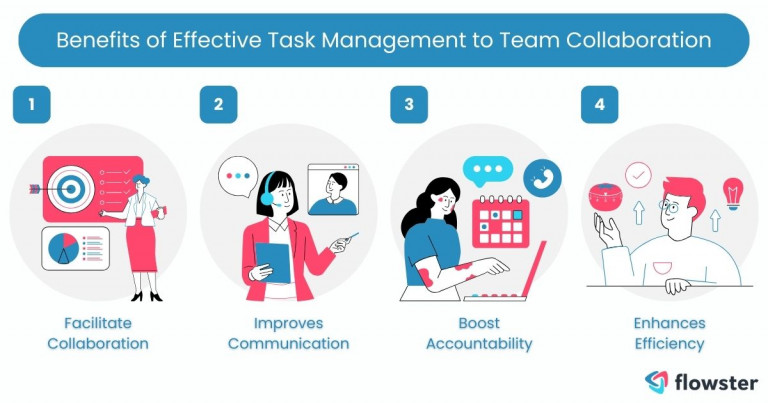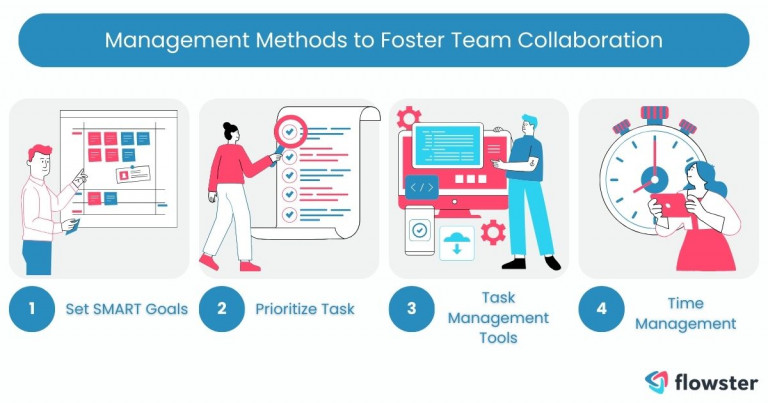Have you ever been part of a team project that felt like spinning your wheels? Emails pile up with conflicting instructions, deadlines loom large, and nobody’s quite sure who’s responsible for what. This chaotic scenario, unfortunately, is all too common. The culprit? A lack of collaborative team management and task management.
The good news is that achieving project success doesn’t have to be a battle against disorganization. By implementing strong task management strategies within a collaborative team environment, you can transform your workflow.
This guide will delve into the world of collaborative team management, where open communication and shared goals fuel productivity. We’ll explore why effective task management forms the backbone of successful teamwork and equip you with practical tools and techniques to streamline your projects.
Key Takeaway:
Effective task management, with its focus on clear goals, organized workflows, and efficient communication, forms the backbone of successful collaborative team management. It empowers teams to achieve their full potential by ensuring everyone is on the same page, working towards a shared objective.
Article Outline
Defining Key Concepts
Before we dive into the magic of combining these two powerhouses, let’s solidify our understanding of each.
Collaborative Team Management:
- What it is: Collaborative team management is a leadership style that prioritizes shared decision-making, open communication, and teamwork. It fosters a sense of ownership and accountability among team members, encouraging them to work together towards a common goal. This approach is a stark contrast to hierarchical structures where information flows top-down and communication can be limited.
- Benefits: Implementing collaborative team management can unlock a treasure trove of advantages. Teams experience a boost in productivity as tasks are streamlined and communication is clear. Open communication fosters trust and improves morale, leading to a more engaged and motivated workforce. Additionally, diverse perspectives and skillsets are encouraged, leading to better problem-solving and more innovative solutions.
Task Management:
- What it is: Task management refers to the process of planning, organizing, prioritizing, and completing tasks effectively. This involves breaking down large projects into smaller, manageable steps, assigning tasks to team members with clear deadlines, and tracking progress towards completion.
- Purpose: Effective task management is the engine that drives project success. It ensures everyone is on the same page, deadlines are met, and project goals are achieved. By visualizing workflows and identifying potential roadblocks in advance, teams can adapt strategies and maintain momentum. Additionally, task management tools like project management software can further enhance transparency and accountability within a team.
Team Collaboration in Project Management:
- What it is: Team collaboration in project management involves working together towards shared goals through open communication, shared resources, and a supportive environment. This collaborative spirit fosters a sense of camaraderie and allows teams to leverage the strengths and expertise of each member.
- Importance: Collaboration is the secret sauce for maximizing a team’s potential. By fostering open communication and knowledge-sharing, teams can identify and address challenges more effectively. Collaboration also allows individuals to learn from each other, leading to personal and professional growth. Ultimately, a collaborative project management approach leads to better results, higher quality work, and a more positive team experience.
Now that you understand these key terms, let us look at how effective task management practices promote collaborative efforts.

The Power of Effective Task Management
Effective task management is the cornerstone of successful collaborative team management. It provides a clear structure that empowers teams to work together seamlessly and achieve their goals. Here’s how strong task management practices fuel collaborative efforts:
- Facilitate Collaboration
- Improves Communication
- Boosts Accountability
- Enhances Efficiency
Now, let us look more closely at how effective task management practices foster collaborative efforts.
Facilitates Collaboration:
By clearly defining tasks, assigning roles, and outlining dependencies, task management creates a foundation for smooth teamwork. Everyone understands their individual responsibilities and how their work fits into the bigger picture. This clarity eliminates confusion and fosters collaboration, as team members can work together efficiently without stepping on each other’s toes.
Improves Communication:
Task management tools like project management software can streamline communication and keep everyone on the same page. Team members can easily access updates, share files, and leave comments directly within tasks. This eliminates the need for lengthy email chains and ensures everyone has the latest information readily available. Improved communication fosters a more collaborative environment where team members feel comfortable reaching out for help or clarification.
Boosts Accountability:
Effective task management assigns clear ownership to individual tasks. When team members are responsible for specific deliverables, they are more likely to feel a sense of accountability and ownership over their work. This leads to increased motivation and improved performance, as team members take pride in completing their tasks to a high standard.
Enhances Efficiency:
Clear task management helps avoid duplication of effort and optimizes workflows. By visualizing project tasks and identifying dependencies, teams can streamline their processes and identify potential bottlenecks. This allows them to allocate resources efficiently and ensures everyone is working on the most impactful activities at any given time. This focus and organization lead to significant gains in overall productivity.

Mastering Task Management Strategies
Now that we understand the power of effective task management, let’s delve into practical strategies you can implement to master this skill. By adopting these methods, you can transform your team’s workflow and unlock a new level of collaborative productivity.
A. Setting SMART Goals:
The foundation of successful task management lies in setting clear and achievable goals. This is where the SMART goal framework comes in. SMART stands for:
- Specific: Clearly define what you want to achieve. Instead of a vague goal like “improve marketing,” a SMART goal might be “increase website traffic by 20% in Q3.”
- Measurable: Establish a way to track your progress. How will you know if you’ve achieved your goal?
- Achievable: Be realistic about what can be accomplished within a given timeframe and with available resources.
- Relevant: Ensure your goal aligns with your overall project objectives and team priorities.
- Time-bound: Set a specific deadline for achieving your goal. This creates a sense of urgency and keeps the team focused.
By setting SMART goals for your projects and individual tasks, you provide a clear roadmap for your team and ensure everyone is working towards the same objectives.
B. Prioritization Techniques:
Inevitably, your team will have a multitude of tasks vying for attention. Here’s where prioritization techniques come in. Popular methods like the Eisenhower Matrix can help you distinguish between urgent and important tasks, allowing you to focus your efforts effectively.
The Eisenhower Matrix categorizes tasks based on urgency (urgent vs. not urgent) and importance (important vs. not important). By analyzing tasks through this lens, you can determine whether a task needs to be completed immediately, delegated, scheduled for later, or eliminated altogether.
C. Utilizing Task Management Tools:
Technology can be a powerful ally in your task management journey. Project management software and dedicated task management tools offer a plethora of features to streamline your workflow and foster collaboration. These tools allow you to:
- Create and assign tasks: Clearly define tasks, assign them to team members, and set due dates.
- Track progress: Monitor individual and team progress towards completion.
- Facilitate communication: Enable team members to collaborate on tasks, share files, and leave comments directly within the platform.
- Visualize workflows: Utilize features like Kanban boards or Gantt charts to visualize project timelines and dependencies.
The right tool can become the central hub for your team’s project management, fostering a collaborative environment and boosting overall productivity.
D. Time Management Tips:
Even with the best tools, effective task management requires strong time management skills. Here are some practical tips to help you stay focused and organized:
- Timeboxing: Allocate specific blocks of time for dedicated tasks. This helps you stay focused and avoid distractions.
- Create to-do lists: Break down large projects into smaller, actionable steps. Checking completed tasks off your list provides a sense of accomplishment and keeps you motivated.
By implementing these strategies and fostering a collaborative team environment, you can transform your task management into a well-oiled machine, propelling your team towards success.
Transform Your Business with Flowster's AI-Driven Automation
Conclusion: Take Collaborative Team Management to the Next Level!
The synergy between collaborative team management and effective task management is the recipe for project success. By fostering open communication, shared responsibility, and a clear roadmap through task management, teams can work together seamlessly and achieve remarkable results.
Clear task allocation creates a foundation for collaboration, while strong communication tools keep everyone informed and aligned. This fosters a sense of ownership and accountability within the team, leading to increased productivity and a higher quality of work. In the end, collaborative team management made possible by efficient task management techniques creates a more active, effective, and successful team environment.
Ready to take your team collaboration to the next level? Explore the wealth of resources available on collaborative team management techniques and task management strategies. Implement these practices within your team and witness the positive impact on teamwork, communication, and overall project success.
Easy process documentation tool?
Flowster makes it simple to document your processes using artificial intelligence, or you can browse our pre-built workflows and SOP templates in the Flowster Marketplace. These templates are designed to meet a variety of business needs and are easily customizable to meet your specific requirements.
Do you need help? Use our “Done for You” services to have our quality and improvement experts design custom workflows for you. Our team can help you create SOPs from scratch, ensuring that they are fully aligned with your business processes and goals.




